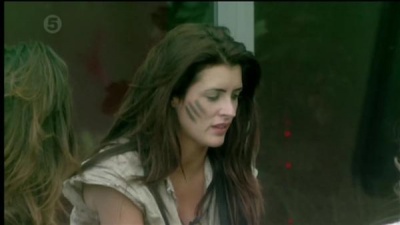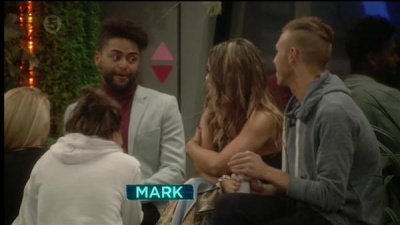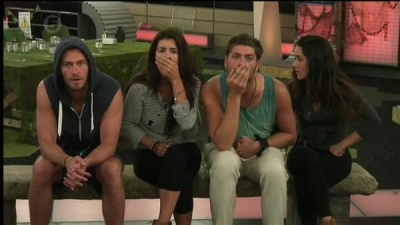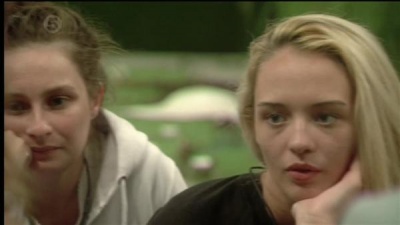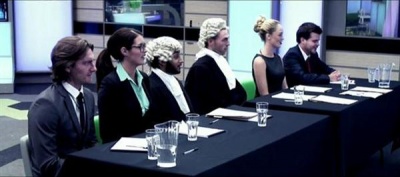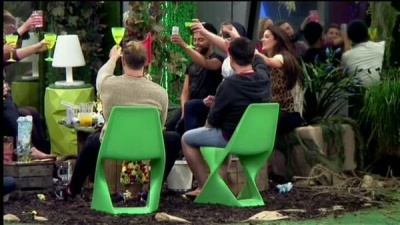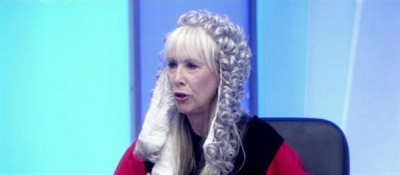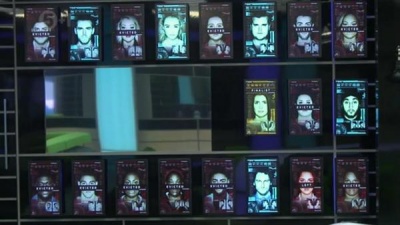Weaver's Week 2014-08-17
Last Week | Weaver's Week Index | Next Week
Let's get in that pond.
Big Brother
Endemol for Channel 5, 5 June — 15 August 2014
"This year is Power Trip – gaining power, keeping power, who will have power, how do they get it?" said Emma Willis before the series began. "Do people use it for good, for bad, for manipulation, to win friends, to stay in the house, to get people out the house?
We'd like to explore some of these questions using evidence from the broadcasts. We'd like to, but we can't. Though they pretended to cede a little from time to time, power remained with the show's producers throughout.
The producers exercised power in many ways. One was by constantly reminding us that this was "Big Brother: Power Trip". Last year's subtitle (remember? "Secrets and Lies") was used for the first ten days, and then quietly dropped. This year, "Power Trip" remained in place for over a month, only dropped after "Armageddon Week".
The producers exercised power by fiddling with the nominations. Once upon a time, this was a simple process. Each lab rat suggested two others, and the ones with the most internal nominations were up for the public vote. Not this year. The viewers appointed Pauline Bennett as a "power housemate" on the opening night. Pauline chose someone to go straight through to the final, and someone else to be up for eviction every week.
The net result is that Helen Wood was straight through to the final. Miss Wood is no stranger to the newspapers, having been linked with Wayne Rooney and other famous men. Her presence on the programme would ensure favourable coverage in the Daily Star, and might tempt other tabloids.
Freedom from eviction allowed Miss Wood considerable latitude to offend other lab rats. Some viewers thought that the producers protected her. Some viewers claimed that she was "bullying" other lab rats. It was clear that she had her favourites, and she had those she liked less, and she wasn't backwards in coming forward.
The producers' other tricks were variations on a theme. Chris Wright picked five lab rats for the public vote (excluding Helen Wood, and not counting Jale Karaturp who had been auto-nommed the previous week). Matthew Davies and Toya Washington could void three nominations, but one of them had to stand in the public vote.
Three women were evicted in the first three weeks, so the remaining women could choose men for eviction. (Miss Karaturp's automatic nomination was rescinded for this week.) Later, Ashleigh Coyle got to pick her friends and enemies, unaware that the enemies would take a "save and replace" task, and aware that she couldn't pick Helen Wood. There was some fiddling about with a "power cell" allowing calls home, there was the annual messing about with "letters from home", and there was some baloney with the prize fund.
"Armageddon Week" saw three people enter, and three people leave, and the public had a say in one of them. Marlon Wallen left the studio because he received the most nominations – we don't believe the full nominations list was ever broadcast. Biannca Lake arrived on Monday, and left on Friday after a public vote. Danielle McMahon was evicted by the remaining "new housemates", apparently on a whim after their first target was unavailable.
That first target was Kimberley Kiselovich, who was in hospital for medical attention – she did not return to the studio. A week earlier, Ms Kiselovich had an intimate moment with Steven Goode. Ten years earlier, the suggestion that Michelle and Stu had done 'it' was on the front pages of the tabloids. This year, an inside page in the Daily Star.
Ten years ago, the lab rats were isolated from the world. For some years, this rule has been broken at the producers' whim. Witness the organised chanting at the weekly exit shows, chanting that the producers choose not to stop.
One such chant referred, however obliquely, to Mr. Goode and Ms Kiselovich's coupling. That was one of many times Danielle McMahon took a particular moral position. She has strong views about personal morality, and was not shy about expressing them. This column disagrees with her specific views, and welcomes the opportunity to see a challenging point of view expressed on television. We had a mischievous thought: Miss McMahon might have been cast as a representative of the Junior Anti-Sex League, maintaining the unrealistic standards imposed on television by OFCOM.
Though it wasn't obvious from the broadcasts, many of this year's lab rats were smart and intelligent people. Another year, Christopher Hall and Chris Wright could have been in a joyful double act. Kimberley Kiselovich and Matthew Davies also had sharp wits, but we rarely got to see them. This column doesn't believe that the Big Brother studio is inhabited by morons and dimwits. It contains all shades of human life. Entrepreneurs and organisers and layabouts and cooks and geeks and freaks and people who will answer "why are you here" with "er, I've been evicted."
On opening night, the game show commentariat noted that many of this year's lab rats were capitalists, the sort of people who run their own business. This isn't a surprise: the lab rats are young people. Researchers have found that young people would rather make their own way in the world. They expect to solve social problems themselves, alone or through the power of crowds. They might work on something with businesses, or with charities, or with voluntary groups. They don't expect the state to solve everything.
People in the Big Brother generation expect the freedom to choose, and to take responsibility for their choices. The generation doesn't believe there's only one true path, and that applies in consumer and in moral matters. Young people to have options, to have the facts and tools and opportunities to meet their goals. Life is a perpetual beta test: try, fail, amend, repeat.
The generation is self-reliant. It wants equal opportunities far more than it wants equal outcomes. The big concerns for teenagers (the show's viewers) are to get a job, fund their education, move out of the parent's house, and possibly starting a business. These people are practical, aim for specific goals, and are incredibly flexible. Some are like a raindrop going down a hill, sure to reach the pond at the bottom, unsure of the precise route ahead.
Young people ask not "what can the state give me", but "what can the state do to help me help myself." It's all about action from the bottom, not following diktats from the top. Promises like the "Big Society" (circa 2009) were dismissed as nebulous tosh, but inspired cheap government loans to help people start up their own businesses. The young person has a good idea, makes a plan, convinces someone else that they know what they're doing, and can borrow money at a good rate.
The established political order seems averse to people helping themselves. Britain's major political parties represent the class wars of the 20th century, or the class wars of the 19th century. These parties appear to be remote, and don't seek to connect with young people or their concerns. The perception is that parties don't care what young people think, MPs are remote from their constituents, and all the parties do more to divide the country than unite it.
Two years ago, we came across a piece from Nick Barlow, a councillor in Colchester. He remarked that elections have become a feast of negativity, "we need to win to stop them winning because they're bad." The media must take its share of blame, when "every new initiative is discussed in terms of how it well affect the polls, or what it might do for someone's standing in the Cabinet... Let's turn it into a contest as to which party leader can show the most enthusiasm in wolfing down a pasty."
Mr. Barlow continued, "This is why politics looks so ridiculous to most people. The House of Commons looks like nothing more than a middle and upper-class version of Big Brother, as well-educated imbeciles hoot and bray at each other in an effort to win press coverage."
Nick Barlow returned to the topic this week: the system cannot represent political opinion any more. The division between worker and capital has gone, but the two biggest parties still see themselves in those terms. The parties don't reflect differences of opinion on other matters. They look like Westminster wonks talking to Westminster wonks. Regular citizens don't see the point of engaging with these wonks. Many of them cannot talk the high-faluting wonkish jargon. And so the parties drift off into increasing irrelevance.
Politics goes beyond the Westminster bubble. Grand political questions do interest young people, but the navel-gazing of Westminster politics bores them. Who cares if the Under-Secretary for Paperclips gets promoted to be Minister of Biscuits? What's the policy on private renting? Or entrepreneurship? What does this mean for the young person in Elstree?
We agree with Mr. Barlow's conclusion: "most people ignore most politics, because most politics ignores most people."
And so back to Emma Willis. "This year is Power Trip – gaining power, keeping power, who will have power, how do they get it? Do people use it for good, for bad, for manipulation, to win friends, to stay in the house, to get people out the house?" Big Brother is society in miniature. It asks difficult questions about society, some of those questions are not obvious when you only look at the studio.
Our overwhelming memory of this television series has been sheer, unremitting, dull-as-anything tedium. The lab rats never had a chance to submit their least-preferred minority to the public vote. Every single week, the producers intervened – messing about with the nominations, immunity was awarded, immunity was rescinded. We must conclude that Helen Wood's remained a finalist only because the producers wanted her around. Had there been no all-series immunity, Miss Wood would have left months ago.
Worse, the producers invented tasks to set lab rat against lab rat. Whenever it looked like everyone was getting along and people were going to be friends, another completely artificial divide came down. Lab rats were encouraged to bully other lab rats, hoping to curry favour with the party in charge. According to the producers, rows and arguments make for good television.
We disagree. It might make for popular television, but the episodes were dour and cheerless and thoroughly depressing. The show wasn't entertaining. It revolved around Helen. When, in the final week, the show started to revolve around Ashleigh, viewers jumped up to say "Helen's getting a rubbish edit." No: she's getting an equitable edit, but viewers are so accustomed to The Helen Show that fairness appears to be bias.
The whole thing came to a head in the final week, when Judi James stepped up from Bit on the Psych to pass "judgement" on whether Ashleigh or Helen was responsible for the ill-feeling in the studio. The lab rats were encouraged to say "she started it" "no, she started it." None of the remaining male lab rats thought, "oh, *I* might have started it." There was no mention of "well, setting us workers against each other while the producers swan around is such a metaphor for late-order capitalism."
We didn't hear anyone say, "The fault is with the Big Brother character. Every day, it sets us tasks designed to set us against each other. We're rewarded for being nasty, trained like Pavlov's overgrown lab rats. And now, when it's a bit late, they're asking us to decide which dog has stepped on the bell most often? Sheesh, you producers pretend not to know psychology, but you've achieved what you wanted to achieve. Shame it was so limited, shame it made such joyless, ill-tempered, grim, and ultimately unwatchable television."
Every lab rat goes into the Big Brother compound for a reason. Some of them know what that reason is, many do not. We hope and trust that everyone has found something of themselves in that studio. Reassurance. Confidence. Friendship. Challenges.
And, for Helen Wood, popularity and the prize of £110,000. Well, certainly the prize. We're not convinced that Miss Wood won through genuine popularity. In the final minutes of voting, host Emma Willis told us "it's neck and neck". Gamblers who backed Miss Wood at 20/1 early in the series, or at 9/1 in finals week, had four minutes to reach for their phones and influence the vote. Spend 50p to win hundreds.
We don't know if Helen would have won without the gamblers. We don't even know that there was a disorganised gambling syndicate. We cannot rule out the possibility. But nor can we test that theory. There's no way to contact everyone who voted in the final few minutes and ask "er, were you voting honestly, or were you backing up your bets?" A theory that cannot be disproved is not science, it's religion, it's an article of faith.
So, what have we learned from this year's Big Brother? That a pass to the final seeps into every pore of the series. That the producers will blame anything on women. And that Big Brother still says something about society, however obliquely.
This Week and Next
Glenn Hugill has set up a television company of his very own, Possessed TV. Glenn has been involved with a huge list of great game shows: he hosted The Mole (2001), and was behind the scenes on Beauty and the Geek (2004), Cash Cab (2005), The Whole 19 Yards (2010), and Pointless (2009-). His work on Deal or No Deal (2005-) included resident player The Banker. Glenn's name in the credits has always concluded a show with depth. Possessed TV will, for the time being, be a part of ITV Studios. His statement in the press release was as cryptic as a Cantona quote:
- "Modern viewers have so taken control as to redefine what it means to watch TV. It's a bit like discovering the house you've lived in for 50 years has a huge attic you never knew about. And a garden. With a pond in it. The time is right and the fit with ITV Studios feels great. Let's get in that pond."
"Be quick and be right." University Challenge reached heat (er) four. St Anne's Oxford (Sam Zwolinski, Laura Ludtke, Edward Hicks, Rebecca McKavanagh) played Gonville and Caius Cambridge (Ted Loveday, Michael Taylor, Anthony Martinelli, Jeremy Warner). That's the team with the beavers against four blokes we didn't see in Class of 2014, possibly because they are four blokes.
St Anne's know where to find the Black Country, so we know which side we're backing this week. Gonville and Caius know all about Mr Babbage, so we know which side our survey is backing this week. Gonville and Caius move to the early lead, and remember the great originator of Gonzo journalism. By the audio round, the Cambridge side is over 100 points ahead. And wasn't "songs named after chemical elements" a Pointless round recently?
Gonville and Caius have four blokes. They're set three questions about female psychoanalysts. No points there, but it hardly matters. By the time St Anne's get the dreaded "there's plenty of time", the lead is 160 points, and there will only be one winner. Gonville and Caius are a grand team, running up to a 305-105 win. There are some holes in their knowledge, and the filming schedule is short (G&C have three weeks to brush up), but they look like a side that could be dangerous.
A piece of magic: The Link has been renewed for BBC daytime. We're particularly pleased to hear that they're tightening up the connections.
Fifteen years after the last run, ITV's making a new series of Mel and Sue's Light Lunch. Forty years after the last run, ITV's making another series of Sunday Night at the London Palladium. The venue's become free after the unexpected failure of I Can't Sing The X Factor Musical.
News from down under, where The X Factor Australia is set to begin soon. They're promoting the show with "The X Factor Radio", a show syndicated to stations across the nation. We're slightly surprised that The X Factor UK (co-creator: Ashley Tabor) hasn't worked with Global Radio (prop: Ashley Tabor) for a similar show here. It would be the perfect fit, a national talking point for national stations Heart and/or Capital.
Local television news, and London Live is to stop making programmes that young people don't watch. The channel, part of the Evening Standard empire, will now make programmes that slightly older people don't watch. We're not sure if this makes it any more likely that Ctrl Freaks will return. It can hardly make it less likely.
BARB ratings for the week to 3 August.
- Coronation Street was the most popular show, 6.5m on Monday night. Mr and Mrs remained the top game, 3.05m viewers.
- Dragons' Den (2.6m) was the BBC's top game, just ahead of Catchphrase (2.55m) and Tipping Point (2.35m).
- A week on BBC2 pulled Pointless down to the level of The Chase, around 2m.
- Channel 4's great hype The Singer Takes it All opened to 1.15m, a slightly disappointing figure. Over on Channel 5, Big Brother could only manage 1.3m, painfully low for an eviction show. The night's winner (4.65m average, 7.2m reported peak) was Usain Bolt, so no change there.
- Top digital show: 8 Out of 10 Cats on Dave (400,000).
This week has Glenn Hugill's new project, Two Tribes (BBC2, 6pm weekdays). ITV has Gift Wrapped (5pm weekdays), which sounds like Mr and Mrs for high stakes. Quizzes are the subject on Come On Down! The Game Show Story (ITV, 7pm Sun). Saturday has Toyah and Limahl on an 80s pop Pointless Celebs (BBC1, 5.40). We can't say who's on Tipping Point (ITV, 7.45) but we're sure they'll make up words and a splash!
And Celebrity Big Brother kicks off on Monday (C5, 9.05). Since the show began on Channel 5, they've been trying to persuade columnist, feminist, and geek Laurie Penny to take part. We can non-exclusively confirm that Laurie won't be among the lab rats this month. She's off to Harvard for a year, and will come back an even more compelling writer. And that *is* a power trip.
Photo credits: Initial (an Endemol company). For some of the facts in the main article, we credit Ipsos Mori's "Generation Strain" report and "Generation Citizen" from Demos.
To have Weaver's Week emailed to you on publication day, receive our exclusive TV roundup of the game shows in the week ahead, and chat to other ukgameshows.com readers, sign up to our Yahoo! Group.


